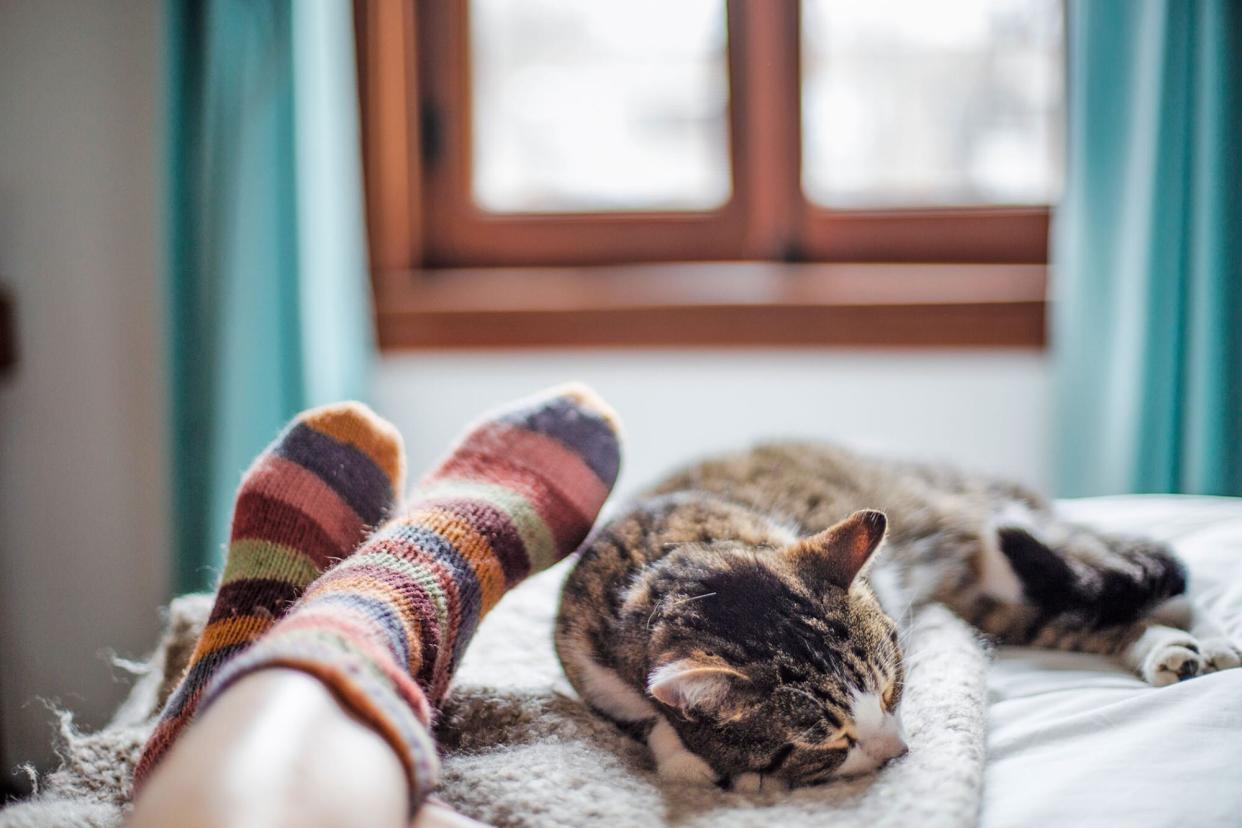Could Your Cat Have Coccidia? Signs Your Kitty Is Infected With This Pervasive Parasite

Linda Raymond / Getty
Coccidia are a common parasite that make their home in the intestinal walls of cats. In fact, they're so pervasive that the Merck Veterinary Manual notes that almost every cat will become infected with one species of the parasite at some point in their lives.
But this isn't a cause for panic, says Alisa Hutchison, DVM, MPH, a professor of community medicine at the University of Missouri College of Veterinary Medicine in Columbia, Mo. Coccidia don't always cause disease, she explains, and there are effective treatments available when they do.
Still, the prevalence of these pesky (and sometimes life-threatening) parasites highlights the importance of regular fecal exams for your cat.
What Is Coccidia?
Coccidia are single-celled parasites called protozoa that infect the intestinal tract of cats. According to Hutchison, there are several different species of coccidia that affect felines, including species of Isospora, Toxoplasma, Hammondia, Besnoitia, Cryptosporidium, and Sarcocystis.
Hutchison says the Isospora species (Isospora felis and Isospora revolta, also called Cystoisospora spp.) are by far the most common in cats. They're also species-specific. This means, for example, that dogs cannot get infected with the two Isospora species that infect cats. And thankfully, humans can't either. However, Hutchison notes that some of the other coccidia species (like Toxoplasma gondii) are potentially zoonotic (which means they can be passed from pets to people).
How Do Cats Get Coccidia?
Infected cats shed an immature form of coccidia (called oocysts) in their poop. After a short period of time, these oocysts become sporulated, or infective. Healthy cats become infected with coccidia when they consume soil or other contaminated things in their environment that contain these sporulated oocysts. This can easily occur when grooming their fur and paws.
Cats can also get coccidia by eating infected intermediate hosts of the parasite, including mice, rats, crickets, and cockroaches.
RELATED: Does Your Cat Have Giardia? Here Are the Signs of This Parasitic Infection
Signs and Symptoms of Coccidiosis in Cats
Not every cat with coccidia will have signs of infection or disease. When illness does occur, it's called coccidiosis and is most often seen in young kittens and in older cats with weakened immune systems.
According to Hutchison, the most common signs of disease caused by coccidia are naturally related to the digestive system (where the parasites live) and include:
Hemorrhage (rare)
Hutchison adds that cats with severe disease can exhibit anorexia, vomiting, and mental dullness, and they can ultimately die because of complications from the disease.
Because these signs aren't specific to coccidiosis and are associated with a wide range of illnesses, fecal exams—during which veterinarians look for oocysts under a microscope—are essential to making a definitive diagnosis.
Coccidia Treatment in Cats
Not every cat infected with coccidia will require treatment. Many are able to eliminate the parasite on their own.
"If coccidia is identified on a fecal examination and the cat doesn't have clinical signs, it may be most effective to use an easily digestible diet and probiotics to help balance the gut microbiome and then recheck the stool later," Hutchison explains. "But if there are clinical signs, it's a good idea to treat." She adds that, in multi-cat households, if one feline is diagnosed with coccidiosis, all cats in the home should undergo treatment as well.
Hutchison notes that there is currently only one approved treatment for coccidiosis: an oral antimicrobial called sulfadimethoxine. Treatment with sulfadimethoxine could last anywhere from a few days to several weeks to ensure that all coccidia have been eliminated from your cat's gut. "Several other drugs have been tried at various doses with some success," she adds. "Ponazuril has gained popularity and seems to be a promising treatment. Many shelters and catteries are using this drug routinely now in place of the approved sulfadimethoxine."
Despite sulfadimethoxine's success with treating coccidiosis, Hutchison says stool sample rechecks are of utmost importance to ensure the parasites aren't resistant to the treatment. She also notes that some coccidia go into a sort of remission called premunition, where the immune system is controlling the disease. This, Hutchison explains, may not last, as once the cat is stressed—such as when a kitten is adopted and moves into a new home—he can once again start shedding the parasite, become infective, and/or exhibit clinical signs.
For cats with severe coccidiosis, additional treatments may be needed. For example, fluid therapy would be indicated for a cat with severe dehydration.
RELATED: Could Your Cat Have Hookworms? Detecting, Treating, and Preventing Hookworms in Cats
How to Prevent Coccidia Infection
Hutchison says that environmental control of coccidia is very important. "Coccidia are hardy and difficult to kill with routine disinfectants that are safe for pets," she explains. The Companion Animal Parasite Council notes that infective oocysts can survive as long as one year in certain environments.
If your cat is diagnosed with coccidia, Hutchison recommends promptly cleaning the litter box after each bowel movement. You should also steam or pressure wash your cat's litter box with the hottest possible water every time you change the litter, she says.
It's important to note that even asymptomatic cats can shed oocysts in their poop that go on to infect others—or even reinfect themselves. Yearly fecal exams are a key component of both detecting and preventing the spread of this parasite.
Finally, because cats can get coccidia by eating certain prey, Hutchison says you should minimize your feline's hunting habits. Luckily, there are many toys available that can give your cat the thrill of the hunt without the pain of parasites.

